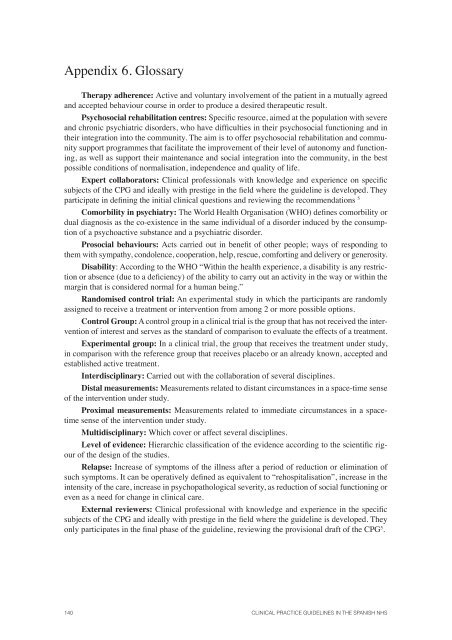CPG for Psychosocial Interventions in Severe Mental ... - GuÃaSalud
CPG for Psychosocial Interventions in Severe Mental ... - GuÃaSalud
CPG for Psychosocial Interventions in Severe Mental ... - GuÃaSalud
Create successful ePaper yourself
Turn your PDF publications into a flip-book with our unique Google optimized e-Paper software.
Appendix 6. Glossary<br />
Therapy adherence: Active and voluntary <strong>in</strong>volvement of the patient <strong>in</strong> a mutually agreed<br />
and accepted behaviour course <strong>in</strong> order to produce a desired therapeutic result.<br />
<strong>Psychosocial</strong> rehabilitation centres: Specific resource, aimed at the population with severe<br />
and chronic psychiatric disorders, who have difficulties <strong>in</strong> their psychosocial function<strong>in</strong>g and <strong>in</strong><br />
their <strong>in</strong>tegration <strong>in</strong>to the community. The aim is to offer psychosocial rehabilitation and community<br />
support programmes that facilitate the improvement of their level of autonomy and function<strong>in</strong>g,<br />
as well as support their ma<strong>in</strong>tenance and social <strong>in</strong>tegration <strong>in</strong>to the community, <strong>in</strong> the best<br />
possible conditions of normalisation, <strong>in</strong>dependence and quality of life.<br />
Expert collaborators: Cl<strong>in</strong>ical professionals with knowledge and experience on specific<br />
subjects of the <strong>CPG</strong> and ideally with prestige <strong>in</strong> the field where the guidel<strong>in</strong>e is developed. They<br />
participate <strong>in</strong> def<strong>in</strong><strong>in</strong>g the <strong>in</strong>itial cl<strong>in</strong>ical questions and review<strong>in</strong>g the recommendations 5<br />
Comorbility <strong>in</strong> psychiatry: The World Health Organisation (WHO) def<strong>in</strong>es comorbility or<br />
dual diagnosis as the co-existence <strong>in</strong> the same <strong>in</strong>dividual of a disorder <strong>in</strong>duced by the consumption<br />
of a psychoactive substance and a psychiatric disorder.<br />
Prosocial behaviours: Acts carried out <strong>in</strong> benefit of other people; ways of respond<strong>in</strong>g to<br />
them with sympathy, condolence, cooperation, help, rescue, com<strong>for</strong>t<strong>in</strong>g and delivery or generosity.<br />
Disability: Accord<strong>in</strong>g to the WHO “With<strong>in</strong> the health experience, a disability is any restriction<br />
or absence (due to a deficiency) of the ability to carry out an activity <strong>in</strong> the way or with<strong>in</strong> the<br />
marg<strong>in</strong> that is considered normal <strong>for</strong> a human be<strong>in</strong>g.”<br />
Randomised control trial: An experimental study <strong>in</strong> which the participants are randomly<br />
assigned to receive a treatment or <strong>in</strong>tervention from among 2 or more possible options.<br />
Control Group: A control group <strong>in</strong> a cl<strong>in</strong>ical trial is the group that has not received the <strong>in</strong>tervention<br />
of <strong>in</strong>terest and serves as the standard of comparison to evaluate the effects of a treatment.<br />
Experimental group: In a cl<strong>in</strong>ical trial, the group that receives the treatment under study,<br />
<strong>in</strong> comparison with the reference group that receives placebo or an already known, accepted and<br />
established active treatment.<br />
Interdiscipl<strong>in</strong>ary: Carried out with the collaboration of several discipl<strong>in</strong>es.<br />
Distal measurements: Measurements related to distant circumstances <strong>in</strong> a space-time sense<br />
of the <strong>in</strong>tervention under study.<br />
Proximal measurements: Measurements related to immediate circumstances <strong>in</strong> a spacetime<br />
sense of the <strong>in</strong>tervention under study.<br />
Multidiscipl<strong>in</strong>ary: Which cover or affect several discipl<strong>in</strong>es.<br />
Level of evidence: Hierarchic classification of the evidence accord<strong>in</strong>g to the scientific rigour<br />
of the design of the studies.<br />
Relapse: Increase of symptoms of the illness after a period of reduction or elim<strong>in</strong>ation of<br />
such symptoms. It can be operatively def<strong>in</strong>ed as equivalent to “rehospitalisation”, <strong>in</strong>crease <strong>in</strong> the<br />
<strong>in</strong>tensity of the care, <strong>in</strong>crease <strong>in</strong> psychopathological severity, as reduction of social function<strong>in</strong>g or<br />
even as a need <strong>for</strong> change <strong>in</strong> cl<strong>in</strong>ical care.<br />
External reviewers: Cl<strong>in</strong>ical professional with knowledge and experience <strong>in</strong> the specific<br />
subjects of the <strong>CPG</strong> and ideally with prestige <strong>in</strong> the field where the guidel<strong>in</strong>e is developed. They<br />
only participates <strong>in</strong> the f<strong>in</strong>al phase of the guidel<strong>in</strong>e, review<strong>in</strong>g the provisional draft of the <strong>CPG</strong> 5 .<br />
140 CLINICAL PRACTICE GUIDELINES IN THE SPANISH NHS

















